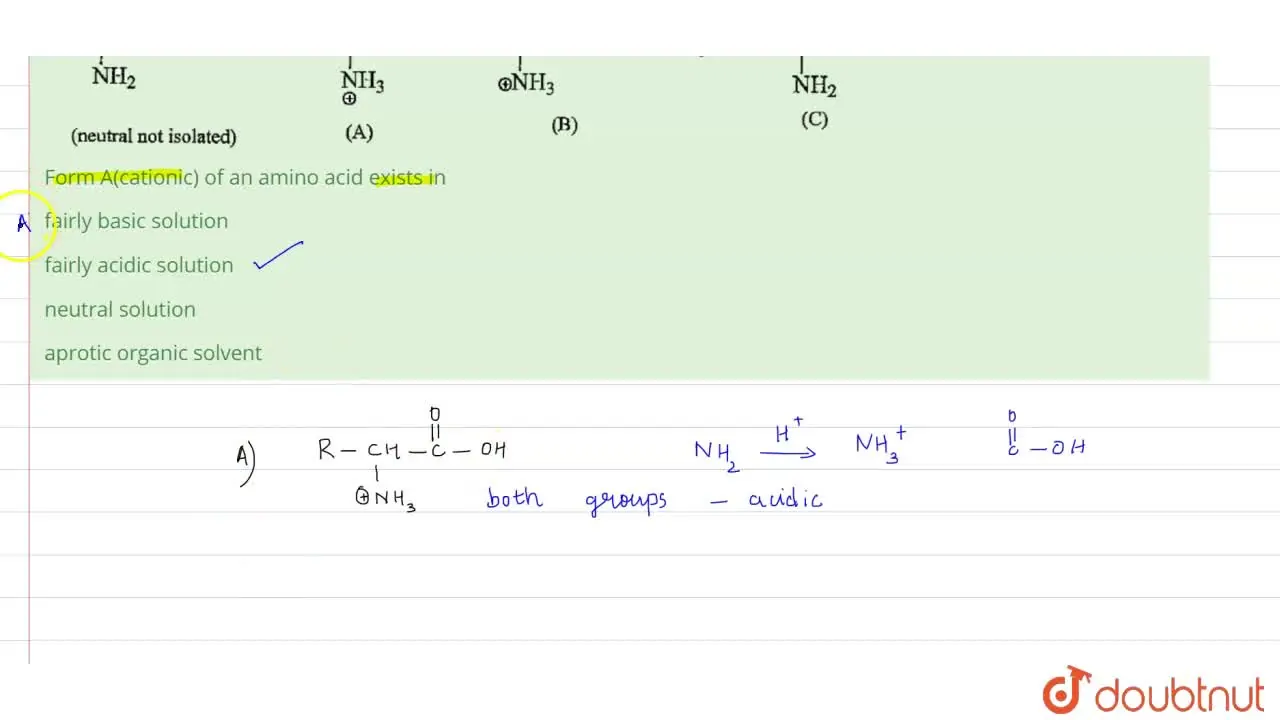Every amino acid has a carboxyl group and an amino group, and each group can exist in an acidic form or a basic form depending on the pH of the solution in which the amino acid is dissolved. The carboxyl groups of the amino acids have pKa values of approximately 2, the protonated amino group have pKa values near 9. Therefore, in a very acidic solution (pH near zero), both groups will be in their acidic forms. At a pH of 7, (which is greater than the pKa of the protonated amino group), the carboxyl group will be in its basic form and the amino group will be in its acidic form. In a strongly basic solution (say pH=11), both groups will be in the basic form.

Form A(cationic) of an amino acid exists inSolution in Malayalam
fairly basic solution
fairly acidic solution
neutral solution
aprotic organic solvent
The correct Answer is:B
fairly acidic solution
Related Playlists
- BOOK - BRILLIANT PUBLICATIONCHAPTER - POLYMERS, BIOMOLECULES AND CHEMISTRY IN EVERYDAY LIFE EXERCISE - LEVEL -III (Statement Type)6videos
POLYMERS, BIOMOLECULES AND CHEMISTRY IN EVERYDAY LIFE
- BOOK - BRILLIANT PUBLICATIONCHAPTER - P-BLOCK ELEMENTSEXERCISE - LEVEL-III50videos
P-BLOCK ELEMENTS
- BOOK - BRILLIANT PUBLICATIONCHAPTER - REDOX REACTION & ELECTROCHEMISTRYEXERCISE - QUESTION (ELECTROCHEMISTRY) (LEVEL -II) (ASSERTION-REASON)3videos
REDOX REACTION & ELECTROCHEMISTRY
Similar Questions
Statement 1: A solution of sucrose in water is dextrorotatory but on hydrolysis in presence of little hydrochloride acid, it becomes laevorotatory.
Statement 2: Sucrose on hydrolysis gives unequal amounts of glucose and fructose as a result of which change in sign of rotation is observed.02:26View SolutionWhich of the following is the correct statement
View SolutionAssertion: After the electrolysis of aqueous CuSO4 solution pH decreases.
Reason: Sulphuric acid is formed.View SolutionSeparation of amino acid into amino and carboxyl group is or Removal of amino group of amino acid to transform it into keto acid is
View SolutionEvery amino acids has a carboxyl group and an amino and each group can exist ian acidic form or a basic form depending on the pH of the solution in which the amino acid is dissolved. The carboxyl groups of the amino acids have pka values of approximately 2, the protonated amino group have pka values neare 9. therefore, in a very acidic solutions (pH near zero), both the groups will be in their acidic forms. At a pH of 7 (which is greater than the pka of the protonated amino group), the carboxyl group will be in its basic form and the amino group will be in its acidic form. in a strongly basic solution (say pH=11) both the groups will be in the basic form. R−CH2∣NH2−O∣∣C−OH(neutral not isolated)H+⇐⇒R−CH∣+NH3−OH(A)⇔R−C+∣NH3−O∣∣C−O−(B)+H+⇔R−CH∣NH2−O∣∣C−O(C)
Form A (cationic ) of an amino group exists inView SolutionEvery amino acids has a carboxyl group and an amino and each group can exist ian acidic form or a basic form depending on the pH of the solution in which the amino acid is dissolved. The carboxyl groups of the amino acids have pka values of approximately 2, the protonated amino group have pka values neare 9. therefore, in a very acidic solutions (pH near zero), both the groups will be in their acidic forms. At a pH of 7 (which is greater than the pka of the protonated amino group), the carboxyl group will be in its basic form and the amino group will be in its acidic form. in a strongly basic solution (say pH=11) both the groups will be in the basic form. underset("(neutral not isolated)")(R-underset(NH_(2))underset(|)(CH_(2))-overset(O)overset(||)(C)-OH)overset(H^(+))(hArr) underset("(A)")(R-underset(NH_(3))underset(|+)(CH)-OH) hArrunderset("(B)")(R-underset(NH_(3))underset(+|)(C)-overset(O)overset(||)(C)-O^(-))+H^(+) hArr underset("(C)")(R-underset(NH_(2))underset(|)(CH)-overset(O)overset(||)(C)-O) For C(anionic) of an amino acid exists in
View SolutionEvery amino acids has a carboxyl group and an amino and each group can exist ian acidic form or a basic form depending on the pH of the solution in which the amino acid is dissolved. The carboxyl groups of the amino acids have pka values of approximately 2, the protonated amino group have pka values neare 9. therefore, in a very acidic solutions (pH near zero), both the groups will be in their acidic forms. At a pH of 7 (which is greater than the pka of the protonated amino group), the carboxyl group will be in its basic form and the amino group will be in its acidic form. in a strongly basic solution (say pH=11) both the groups will be in the basic form. R−CH2∣NH2−O∣∣C−OH(neutral not isolated)H+⇐⇒R−CH∣+NH3−OH(A)⇔R−C+∣NH3−O∣∣C−O−(B)+H+⇔R−CH∣NH2−O∣∣C−O(C)
For B is called01:43View SolutionCarboxylic acids containing an amino group (−NH2) as a substituent are called amino acids. When this amino group substitution is at α position with respect to carboxylic group, the aminoacid is called α-amino acid. The aminoacids with two carboxylic acids are called acidic amino acids whereas aminoacids with two amino group are called basic amino acids Amino acids show amphoteric character. Ali chiral natural amino acids exist in L-form. :
Each of the following represent natural alanine (an amino acid) except03:47View SolutionCarboxylic acids containing an amino group (-NH_(2)) as a substituent are called amino acids. When this amino group substitution is at alpha position with respect to carboxylic group, the aminoacid is called alpha -amino acid. The aminoacids with two carboxylic acids are called acidic amino acids whereas aminoacids with two amino group are called basic amino acids Amino acids show amphoteric character. Ali chiral natural amino acids exist in L-form. : Which of the following is not an alpha -amino acid?
02:20View SolutionCarboxylic acids containing an amino group (−NH2) as a substituent are called amino acids. When this amino group substitution is at α position with respect to carboxylic group, the aminoacid is called α-amino acid. The aminoacids with two carboxylic acids are called acidic amino acids whereas aminoacids with two amino group are called basic amino acids Amino acids show amphoteric character. Ali chiral natural amino acids exist in L-form. :
What would be the net charge on the given amino acid at pH=14?
 View Solution
View SolutionBoth amino group and carboxylic group are in ionised form in alpha acid at pH
01:40View SolutionWhat will be the nature of existence of an amino acid (containing one amino and one carboxylic acid group) in solution of pH<pKa1?
03:08View SolutionIn aqueous solution of an amino acid, the carboxyl group can gain a proton and amino acid can lose a protons hydrogen bonds.
01:00View Solutionअमीनो अम्लों की संरचना में अमीनो समूह तथा कार्बोक्सिल समूह दोनों उपस्थित होते हैं। निम्न में से कौन एक अमीनो अम्ल है?
03:42View SolutionAmino acids have both an amino group and a carboxyl group in their structure. Which amongst the following is an amino acid ?
03:11View Solution(A) Alpha amino acids generally exists as zwitterions.
(R) The basic amino groups of α -amino acids donates a proton to the carboxylic group.04:04View Solution


